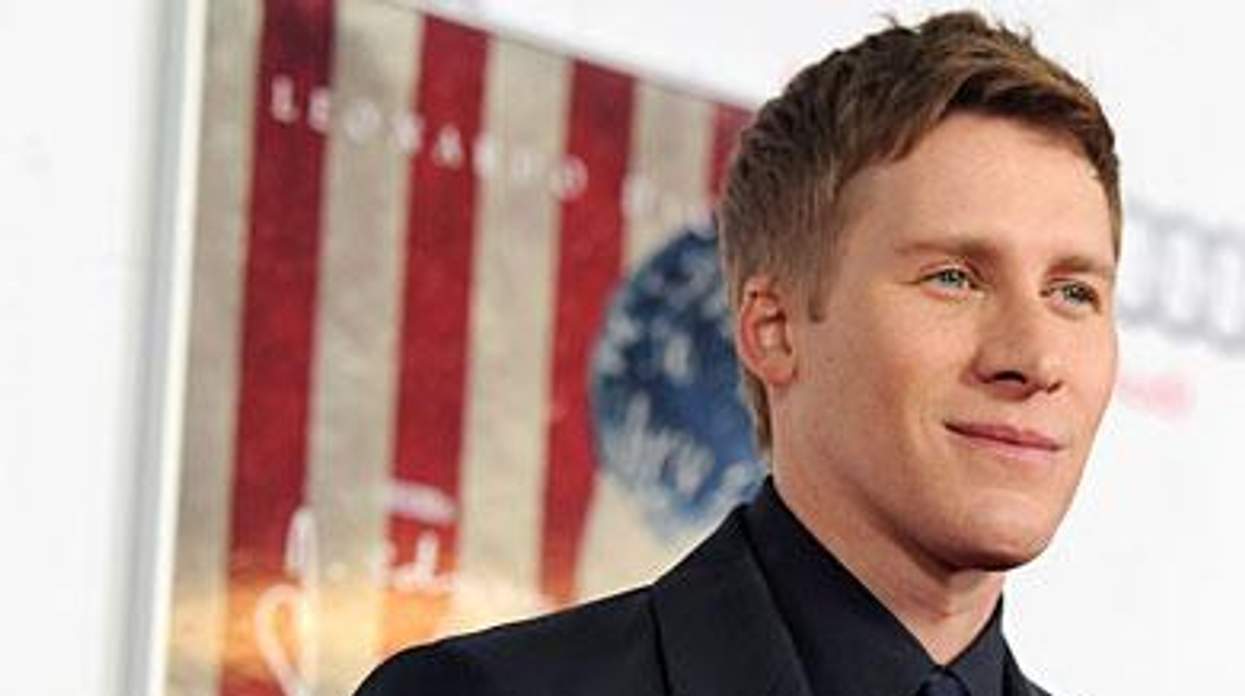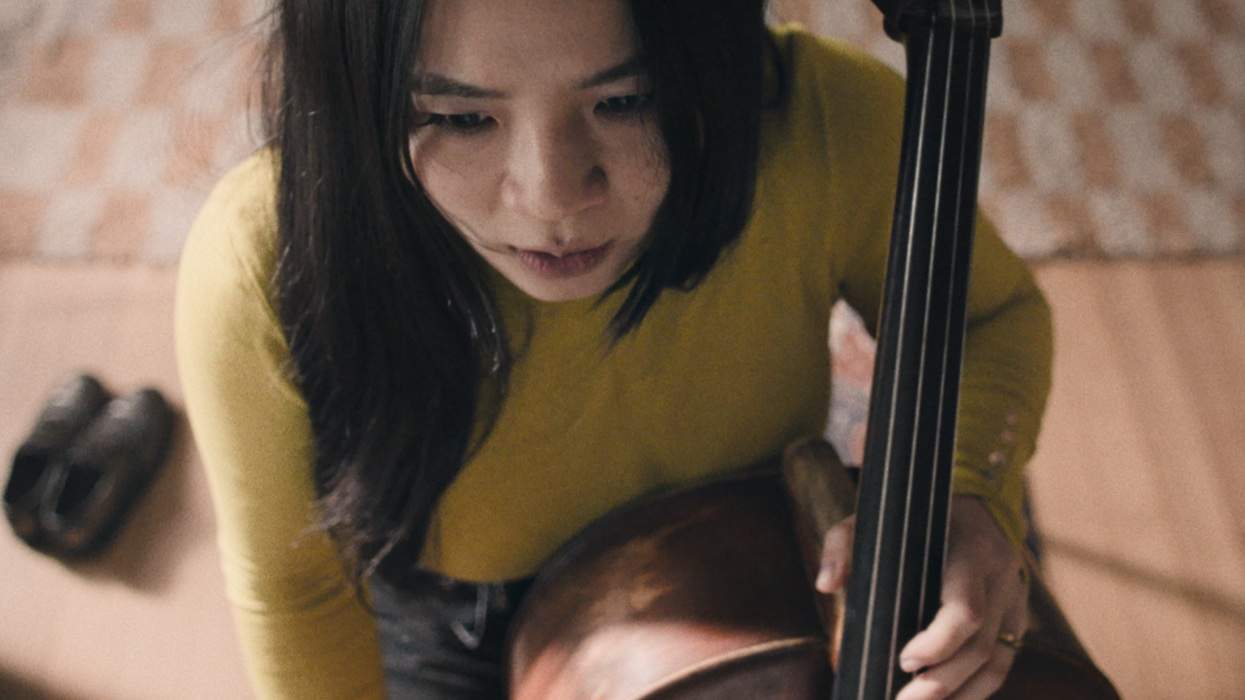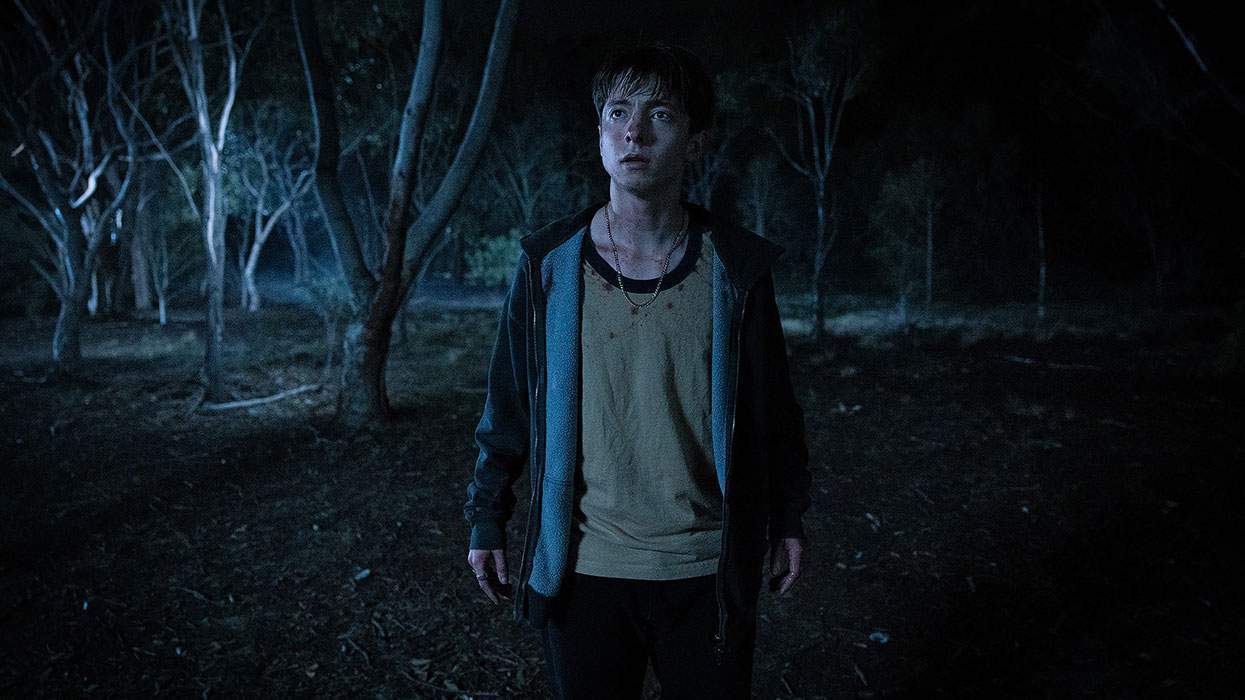Dustin Lance Black is having trouble sitting still. It's the morning after the Hollywood premiere of his new film, J. Edgar, a biography of the notorious and likely closeted head of the Federal Bureau of Investigation, J. Edgar Hoover. He fidgets in his seat a bit, gets up to close the door to escape noise in the hallway, and pours himself a drink. Despite the interruptions, Black is consistently alert and articulate. He's perhaps relieved that the long-anticipated and already controversial biopic is finally being released. Writing a screenplay about such a complicated man was obviously a challenge to the talented 37-year-old. Biographies have speculated on Hoover's relationship with Clyde Tolson, his rather erudite right-hand man, and some have painted him as a cross-dresser. The Hoover portrayed by Leonardo DiCaprio in the Clint Eastwood-directed film emerges as a somewhat sympathetic man capable of great cruelty yet tortured by his affection for Tolson (Armie Hammer). Black tells me that activist Cleve Jones said to him, "I can't believe you made me feel for that monster." Black explains his depiction by saying that if we continue to demonize Hoover, we learn nothing about what causes homophobic behavior. Black's goal is to understand the heart of a monster.
Black's restlessness has served him and LGBT people well. After deservedly winning the Academy Award for his screenplay for Milk and delivering a galvanizing acceptance speech, Black has directed a film, Virginia; is currently working on two screenplays; and is a founding member of the American foundation for Equal Rights, which is leading the federal case against California's discriminatory Proposition 8, which banned same-sex marriage. Black is so committed to this cause that he even penned a stage play, 8, taken from transcripts of the trial, that received a starry staged reading last month in New York. He also finds time to serve on the board of the Trevor Project, which offers crisis intervention for LGBT youth.
Black discusses with The Advocate whether he humanized a monster in J. Edgar (now in theaters across the country), the complicated relationship between Hoover and Tolson, the obligations that come with being a public figure, and even weighs in on the Brett Ratner controversy.
The Advocate: When did you first become aware of J. Edgar Hoover and what was your impression of him?
Dustin Lance Black: I was probably aware of him at a very early age. I grew up in a military family, which was also Mormon and conservative, so he was seen as a bit of a hero. Then as a gay guy coming out, you start looking into your own history and he's seen as this villainous man. He blackmailed gay people and lesbians. I mean, there was certainly a file on Eleanor Roosevelt. He was heinous to, really, anyone who was different or had something to hide, which was highly hypocritical, since he had so much to hide. I thought that if we continue to demonize him, then we learn nothing. This was the most powerful man of the 20th century in the United States. We can't get to the root of why, and we can't fix the why, for me, that went to this big empty spot in his heart that society and his mother created. I met him as both a hero and a villain. The reading I did about him was the same. Every book had a political agenda. It didn't really answer the why questions, it just answered what he did. When it did get into the emotional stuff, it was always sensational. I mean, they had him wearing a ball gown. I thought, Boy this just doesn't ring true.
When the film was announced and all through production, there was a lot of speculation that it would be "de-gayed," presumably due to having Clint Eastwood at the helm. What conversations did you have with Clint about the relationship between Hoover and Tolson?
Clint and I started talking immediately after he signed on. He wanted to know about the sources I'd used. He had so many questions. He wanted to know if his stutter was real or created. He really educated himself on Hoover's life. He never once asked about the gay relationship or the love story. It wasn't until we started shooting that I saw the reverence which he paid this loving relationship. It was incredibly moving to me that he never needed to ask. He treated it as if it was any other love story, with equal respect, dignity, and heart. In fact, he was the one who, after the fight scene between Hoover and Clyde, told Leo to tell Armie he loves him after he left the room. You won't find those words in my script. This fight in the hotel room was all Clint. In terms of de-gaying, if anything, he made it more emotional and more true.
Did your research indicate they had a romantic or sexual relationship?
I don't know how much sex they were having. I couldn't anchor that in anything provable. I also didn't need it for what I was trying to say. They may or may not have, but frankly, I wouldn't want to see it. What's important to me is they were not straight. They were two gay guys, in my opinion. Like any person who began his adolescence in that period, Hoover would have been very confused and very afraid. The things his mother says in the movie would have been things someone like that would say, based on what they heard. The story she tells about Barton Pinkus is true. He was a classmate who took his life after being discovered in a skirt and a bonnet. This is the world Hoover grew up in.
It was really difficult doing this, because I'd catch myself having feelings for him, then I'd go back to all the really terrible things he did in the '50s, '60s, and '70s. I'd think, What am I doing? Am I humanizing a monster? But we need to understand why someone who was so promising and charming had it all devolve as he got older and tried to hold on to power and the public's admiration. I thought we needed to know what was in his heart. When people come to the movie and their kids say they don't want to dance with women, instead of saying what Hoover's mother says, they might say that's OK. Feel free to love, feel free to start a family. They'll know there's more than fame and adoration -- these are very fleeting things.
How do you think Hoover would have functioned if he'd been born a half a century later?
That would have been around 1945 -- he might have been able to operate similarly for some time, but if he had stayed in power as long as he did, he would have lost power. He operated on information and being able to gather information and, under the guise of keeping people safe, was able to gain real power. In this day and age you can't keep secrets as long, so his secret files wouldn't have the power they had then.
What I meant was, do you think he would have been more comfortable with what we presume is his sexual orientation if he'd been born later?
Being born in 1945 would still have made his adolescence pre-sexual revolution and pre-Stonewall. Maybe if he was born 75 years later, there's a chance he might have. He certainly wouldn't have been up against as much. When he was born there was no such as thing as being out of the closet, of being open about who you were. It didn't exist. There weren't even hard definitions for being gay yet. Gay was something you heard about in a song, and it meant you were having a fabulous time. I think there is a chance, but he would have had to be born into a family that was supportive. He would have needed a mother and/or a father who would be supportive when it became clear that he was attracted to people of the same sex. I think it's more the generation now that's benefiting from our new understanding of sexuality. I don't know that in 1945 or even 1975 we were there quite yet.
One of the key issues that's brought up in J. Edgar is the right to privacy. And you've, I think, struggled with privacy issues. How did writing this film make you consider the way celebrities are dealt with in terms of their right to privacy or the public's right to know?
When I was working on the film there were so many examples of Hoover crossing the line and invading people's private lives. I had so much to choose from, but I wanted to pick an event that young people would respond to on an emotional level. That's why I chose Dr. Martin Luther King Jr. I think young people know who he is and admire him. It would seem absolutely heinous that he was prying into his personal life. We know the great good that King did. If someone pried into his life and exposed what was going on there, it might have ruined him, and we wouldn't have enjoyed the great good he accomplished. If someone is breaking the law, I think we can talk about it, and we should. But probably he hurt a lot of people who could have done great good by attacking their personal lives. Do you see Hoover as the flip side of Harvey Milk?
Yes. This movie to me was the chance to look at the other side of that -- the dark side. This was a man of extraordinary political power. Obviously Harvey had very little and was working to get just a tiny piece of it. When Harvey came out he gave people hope. This man remained closeted and by doing so, spread fear and used it as intimidation. I wanted to explore that. If Milk was an inspirational tale, I wanted to write a cautionary tale. In this country even today, parents are raising little Hoovers.
How have attitudes toward LGBT people have changed since Milk was released?
I feel we're in a time of great change in the LGBT community. Milk can be a marker, but at the same time the film came out Proposition 8 [which banned same-sex marriage] was taking place in California. One of the things that happened, and I hope it continues to happen, is we're taking the argument out of the red-blue divide. I'm not a conservative, I'm not a Republican, and I don't declare a party, but what I do is reach out to the right. I reach out to conservatives. Crafting our federal case [for marriage equality], we certainly have built it with people from every political persuasion. I think that's an important sea change. If this is going to be a civil rights fight that we win and lasts, it will need to be taken out of the red-blue divide. It can't be a political issue -- it has to be seen as a civil rights issue.
Being in the public eye and so politically active, do you feel obligated to speak out and to write plays like 8?
I've always been very politically active. I was fortunate that things happened in my career during the past few years that elevated my voice. More than anything, I feel a responsibility to lead responsibly and support our causes. It's a great privilege and a great responsibility, and I take it very seriously. Except for what you and a handful of others are writing, there's a paucity of authentic gay characters in film. Do you feel obligated to write about LGBT people?
I wouldn't describe it as an obligation. I think of it as a privilege. I hope this film does well because then we can continue to make films with gay and lesbian characters in them. I've often said I won't be satisfied until we're represented in films and television in equal number as how we exist in real life. I don't think we're there yet. We're still underrepresented. That said, I don't think they have to be all positive portrayals, but in ways we truly exist. I'm drawn to honest stories about gay and lesbian people, or anyone who's an outsider, really.
Your Oscar acceptance speech for Milk was one of the most inspiring in recent years, and now a lot of young gay and lesbian people look up to you. How does that affect the way you live?
I don't know that anything has changed massively in how I live my personal life. There was a reason I started working on Milk. Those are my beliefs. I held those beliefs before I got up on that Oscar stage. If people see me in a positive light, I'm just incredibly thankful for that, I guess. I'm just going to keep doing my thing, and I hope it's helpful. It would be so hypocritical for me to change who I am in any way while I'm fighting for the right for all of us to be who we are. Good or bad, I'm just being me.
As a high-profile gay man, do you feel like you're under more scrutiny than a straight counterpart would be?
I don't think so. We live in a time where if you're in the spotlight, you're scrutinized. If you're going to complain about that then get out. I'm not going to say that sometimes it isn't hard, and sometimes it is hard, but the good stuff far outweighs the scrutiny. It's all worth it, and I think it's important to keep going. I don't think you're doing good work in this world and looking far enough forward unless you're catching a little hell.
Speaking of the Oscars and catching hell, what's your opinion of Brett Ratner stepping down as producer?
I read his apology letter, and I'm very glad he wrote it. It sounds like he'll be making some changes and doing work to correct what he did wrong, so I look forward to that. It's a learning opportunity for a lot of people. I think what he said was incredibly wrong, but if we can learn from it and grow from it, in the end there's something positive to come from it.















Charlie Kirk DID say stoning gay people was the 'perfect law' — and these other heinous quotes
These are some of his worst comments about LGBTQ+ people made by Charlie Kirk.